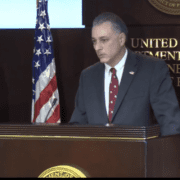Child Protection Unit investigating over 2,500 matters
Black Immigrant Daily News
File photo: Minister of National Security Fitzgerald Hinds.
National Security Minister Fitzgerald Hinds said the Child Protection Unit (CPU) is currently investigating 2,565 matters before it, with another 4,125 investigations being delayed as the results of uncooperative victims or other people.
Speaking in Parliament on Tuesday in response to a question by Moruga/Tableland MP Michelle Benjamin, Hinds said,
“According to information received from the police commissioner, investigations are being conducted by the CPU into 2,565 matters. However, it should be noted that investigations by the CPU into a further 4,125 matters are currently delayed as a result of uncooperative victims or people not keeping their scheduled appointments with the investigating officers detailed, and these appointments include for medical examination, forensic interviews, the purpose of recording statements, and other elements of police investigatory work.”
He said since the establishment of the CPU in 2015, 1,258 people had been arrested for the relevant offences and charged.
Minister in the Office of the Prime Minister (Gender and Child Affairs) Ayanna Webster-Roy said a tentative proclamation date of Sections 3(1), 3(2) and 17 of the Children’s Community Residences, Foster Care and Nurseries Act Chapter 46: 04 has been set as March 2023.
Responding to a question from Moruga/Tableland MP Michelle Benjamin, Webster-Roy said The Children’s Community Residences, Foster Care and Nurseries Act set out a regulatory framework for community residences which is essentially a licensing and monitoring regime. Section 3(1) as amended prohibits a person from operating a children’s home without a residence licence, while Section 3(2) provides that no child shall be cared for in a group home unless a residence licence has been issued in respect of that home. Section 17 establishes an offence for operating a children’s home without a residence licence or for breach of the conditions of the licence as set out in the penalties for the offence.
She said when the Act was proclaimed in 2015, the residential child care sector was unregulated.
“As such, many of the homes needed time and assistance in order to become fully compliant with the licensing requirement. To facilitate this and to avoid the displacement of a significant number of children, the sections have not been proclaimed. Nevertheless the Children’s Authority has worked assiduously to enable many homes to achieve licensing status and to date 18 homes have been licensed.
“It should be noted that since its commencement of occupations, the authority has been carrying out its monitoring function and has been monitoring both licensed and unlicensed homes to ensure the wellbeing of the children resident in these homes. Section 17 creates an offence for operating a community residence without a licence and is therefore linked to Sections 3(1) and 3(2). Hence it will be proclaimed together with these two sub-sections, with a proposed timeline of March 2023.”
NewsAmericasNow.com







Leave a Reply
Want to join the discussion?Feel free to contribute!